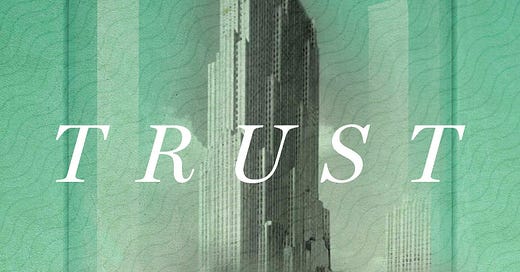'Trust': A novel about capitalism, power and truth
Hernan Diaz's Pulitzer Prize winner centers on a Wall Street mogul.
This post contains an affiliate link or links. If you use a link to buy a book, I may earn a small commission. You can find all the books that have been featured in this newsletter in my Bookshop store.
After Hernan Diaz won a 2023 Pulitzer Prize for fiction (one of two!) for “Trust,” I added the title to my library holds. So did lots of other people. While waiting, I assiduously avoided reading any reviews or other coverage of the book. (I’m like that with movies, too.) So I had no idea I was about to read the literary equivalent of a set of nesting dolls.
The book has four sections, each attributed to a different author. The first section, a novel within a novel, introduces us to Benjamin and Helen Rask, an extremely wealthy New York City couple. He is an uber-capitalist, the invisible hand in the market of the 1920s, pushing it to dizzying heights and then profiting from its crash. She is a philanthropist, channeling apparent guilt over her husband’s financial sleights of hand into support for the arts and other well-regarded causes. The Rasks dutifully host invitation-only events at their mansion that are much sought-after, but their creator, novelist Harold Vanner, portrays Benjamin as socially indifferent, Helen as increasingly mentally unstable.
So absorbing is the Rasks’ story that it’s almost a shock when Diaz opens this doll and reveals the next: a memoir by one Andrew Bevel, whom we quickly realize is the man Benjamin Rask is based on. The heir to a fortune, he’s expanded it vastly, with no reservations or regrets: “And just like my forefathers, I proved that profit, when responsibly made, is one with the common good.” As his memoir unfolds, sentence fragments and random words begin appearing. This is a draft, with placeholders for text to be written later. Why a draft? The next doll holds the answer.
Diaz puts a delightful spin on the literary practice of viewing a character through different sets of eyes. Each doll represents another perspective on capitalism, on power, on truth. We find ourselves on Wall Street, in an Italian anarchist’s apartment, at a Swiss sanatorium. I’m going to stop there. “Trust” was such an enjoyable puzzle to put together, I don’t want to ruin your fun.



